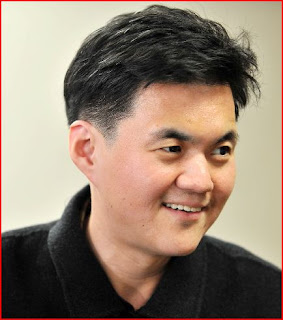
Korea Times Photo by Shim Hyun-chul
What would cost thirty seconds of a subway passenger’s attention to the callings of a blind man?
Nothing for some, too much for others who choose to ignore him. But for Song Yul-koong, his livelihood depends on such relative choices. With unbending consistency for over 18 years, this 37-year-old composer has been raising money on the Seoul subway from 7 a.m. to 8 p.m. Those who take the time to read his story give generously, but the economic downturn reflects heavily upon his meager earnings these days.
A countless number of fancily packaged press releases make their way to the recycling bin, but the Xeroxed pages of handwritten text by Song’s mother, funded by the musician’s subway profits, keep a firm spot on this reporter’s shelf.
In his teens and 20s, Song gave concerts at the most prestigious halls in South Korea including the grand theater of the Sejong Center for the Performing Arts. The media trailed his feats in international competitions and even his appointments with the ophthalmologist. The passage of time, however, has been rather cruel for the artist, now forgotten but penniless as always.
 The Korea Time revisited the composer in over 10 years. Or more precisely, Song found his way back to the newspaper after the long hiatus, though looking just as young, and smiling pleasantly, as he did in his decade-old photographs.
The Korea Time revisited the composer in over 10 years. Or more precisely, Song found his way back to the newspaper after the long hiatus, though looking just as young, and smiling pleasantly, as he did in his decade-old photographs.``Professors and public figures who supported us are no longer able to for various reasons. It’s been difficult but Mr. Obama’s election gave us the courage to rise back up,’’ said Song’s widowed mother Hye-mi, who has always been by her son’s side.
Song beckons a return to the public radar with a proposal to play a piano piece for U.S. President. He urged The Korea Times to help publicize his dream: he was greatly inspired by Obama's election and hopes he can do the same with music for the physically disabled, who face discriminations like many people of color do.
``I cannot see, but there are those who cannot walk or are missing an arm, and my wish to play for Mr. Obama stems from fellow feeling,’’ he said. `` People shouldn’t be disadvantaged or become part of the minority group just because they are different.’’
This blind man’s world may have no light, but sound and fantasy take flight without visible limit in his music. Some of his pieces test conventional concepts of melody and harmony, but others, like the serenade ``Min-sun Sound,’’ has an easy and almost addictive rhythm. Song’s music finds inspiration in the sound of nature and the hidden beauty of things mundane.
As a child, Song would run the faucet all day long, pave the bedroom floor with bottle caps or play with salt -- causing great chagrin for his mother. ``I didn’t realize Yul-koong was experimenting with sound and harshly reprimanded him,’’ she said. Even though a three-year-old Song showed proficiency with the piano the first time he laid his fingers on it, she didn’t realize his musical genius until he remarked one morning, at age 11, ``Here comes a duet song’’ upon hearing two newspaper boys run up the steps of their apartment building.
Without any formal musical training, Song launched a musical career by winning international modern music composition contests in Japan and France, and met great modern composers like Isang Yun and John Cage. The latter supposedly claimed that Song’s works as a child were superior to his own written at age 50. Song wishes to play for Obama ``Song of the Earth,’’ an award-winning piano piece he wrote when he was 10.
``But even if I do succeed in realizing this impossible dream of playing for Mr. Obama, I’m not sure what kind of effect that would have for the physically disabled,’’ he said. ``I have given pretty big concerts, which were not just about my music but also campaigning for causes such as decreasing traffic. But their effects were short-lived. A problem with our society is that there is a lack of enduring interest in social problems,’’ he explained.
One must ask: how much would four minutes of Barack Obama’s time cost? Probably high, considering he’s one of the busiest people in the world. How about the value of inspired music? Priceless -- like a certain credit card advertisement would say. And how about the ripple effect it may have? Boundless.


No comments:
Post a Comment